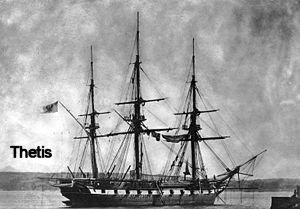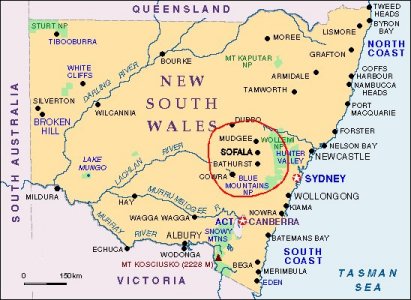
The story of the
Chrimes, Crimes, Chrymes and Crymes
surnames

The story of the
Chrimes, Crimes, Chrymes and Crymes
surnames
Samuel CRIMES - Bigamist and Policeman
Whilst researching the life of this person, a series of seamingly mutually exclusive facts emerged, suggesting the existence of two people in Australia named Samuel CRIMES. The facts are sufficiently interesting in themselves to merit the telling of a story of the two Samuels, but I have now reached the conclusion that there was in fact just one Samuel, whose incredible story is woven into a web of intrigue and confusion.
 Samuel CRIMES was born in 1821 at Rusholme in Manchester, England, the son of a tailor. It seems that Samuel
did not have the best start in life - his mother died when he was just 3 years old, and his father Thomas
died at the age of 38 (Samuel was 15), his burial record describing him as "paralytic", suggesting he had
a drink problem. However, Samuel's grandfather, also Samuel, had been a successful farmer in rural Cheshire,
a member of what this research calls "The Ollerton Branch", so perhaps it is not surprising that young Samuel,
at the age of twenty, decided to leave his troubled upbringing in Manchester and
work for his uncle, the miller Thomas RAWLINS, at Marthall-cum-Warford in Cheshire.
Then in 1848 Samuel decided to make a much bigger move to Australia so, utilising the Assisted Immigrant
scheme, he duly arrived at New South Wales on 27 May aboard the vessel "Thetis". The Assisted Immigrant
passenger list shows that this Samuel CRIMES was from "Warford, Cheshire" so we can be sure that this
record, at least, does indeed refer to our subject Samuel.
Samuel CRIMES was born in 1821 at Rusholme in Manchester, England, the son of a tailor. It seems that Samuel
did not have the best start in life - his mother died when he was just 3 years old, and his father Thomas
died at the age of 38 (Samuel was 15), his burial record describing him as "paralytic", suggesting he had
a drink problem. However, Samuel's grandfather, also Samuel, had been a successful farmer in rural Cheshire,
a member of what this research calls "The Ollerton Branch", so perhaps it is not surprising that young Samuel,
at the age of twenty, decided to leave his troubled upbringing in Manchester and
work for his uncle, the miller Thomas RAWLINS, at Marthall-cum-Warford in Cheshire.
Then in 1848 Samuel decided to make a much bigger move to Australia so, utilising the Assisted Immigrant
scheme, he duly arrived at New South Wales on 27 May aboard the vessel "Thetis". The Assisted Immigrant
passenger list shows that this Samuel CRIMES was from "Warford, Cheshire" so we can be sure that this
record, at least, does indeed refer to our subject Samuel.
In 1854 Samuel CRIMES married Alice GREEN at Sofala, New South Wales and they subsequently had five children between 1854 and 1864. Nothing particularly unusual about this story so far, BUT in 1859 Samuel married Maria AVENEL at Bathurst, New South Wales. This is the first point (of several) when it appears that there may have been two Samuel CRIMES in Australia at that time. However, on this point at least, we can be sure that one Samuel entered into the two marriages, as he was found guilty of bigamy. Although there is no record of the trial, the New South Wales gaol admission register shows that he was sentenced to 6 months hard labour in Bathurst gaol on 20 March 1860.
 We must presume that Alice forgave Samuel as they had further children in 1862 and 1864. The locations of
the two marriages are only 30 miles apart but Samuel used the alias DINNER or DENNER in an attempt to hide
his true identity. Confusingly there was another immigrant named Samuel DINNER, who was also found to be on
the wrong side of the law. This Samuel was imprisoned in 1853, also at Bathurst, having been found guilty of
robbery. However, Samuel DINNER was recorded as being a native of Bristol, England who arrived in Australia
in 1839 aboard the vessel "Orestes". In the New South Wales gaol records, the 1853 record for Samuel DINNER
is cross-referenced from the 1859 record for Samuel CRIMES, implying that the compiler of the records thought
them to be the same person! If the records are to be believed, they were not the same person, but perhaps
Samuel CRIMES deliberately took the name of an actual person when he bigamously married Maria AVENEL. This is
just one of the remaining mysteries of this story.
We must presume that Alice forgave Samuel as they had further children in 1862 and 1864. The locations of
the two marriages are only 30 miles apart but Samuel used the alias DINNER or DENNER in an attempt to hide
his true identity. Confusingly there was another immigrant named Samuel DINNER, who was also found to be on
the wrong side of the law. This Samuel was imprisoned in 1853, also at Bathurst, having been found guilty of
robbery. However, Samuel DINNER was recorded as being a native of Bristol, England who arrived in Australia
in 1839 aboard the vessel "Orestes". In the New South Wales gaol records, the 1853 record for Samuel DINNER
is cross-referenced from the 1859 record for Samuel CRIMES, implying that the compiler of the records thought
them to be the same person! If the records are to be believed, they were not the same person, but perhaps
Samuel CRIMES deliberately took the name of an actual person when he bigamously married Maria AVENEL. This is
just one of the remaining mysteries of this story.
The next time we hear about Samuel he is in totally unexpected circumstances. On 17 December 1860 he was
brought before a judge at the Bathurst Quarter Sessions where it was stated that he, in his role as trooper
(police constable), had allowed a prisoner to escape. A newspaper report of the trial reads:
ALLOWING A PRISONER TO ESCAPE. Samuel Crimes, a trooper in the Western Patrol, on bail, surrendered
himself to take his trial for having suffered one Louis, a Chinese, to escape from custody. Plea, Guilty.
It appeared that three Chinese who had been committed for trial by Joseph Cox, Esq., J.P., were placed in
the custody of the prisoner, who was with them in charge of the lock-up. The prisoner stated that two of the
men were in the cell and asked for some water; he took it to them, and when he opened the door they made a
rush upon him, and one of them escaped. A letter from Mr. Commissioner McLean was read, giving the prisoner
a good character. One prisoner had before escaped from his custody, but that was owing to insecurity of the
lock-up. Captain Battye was called by His Honor, and said that the effect of imprisonment would be to cause
his dismissal from the force; he was aware that the prisoner had a very good character. Alexander Forbes
being sworn, said: I know the prisoner; the lock-up at Sofala is very insecure, there are two apartments;
the prisoner before the court was in charge of three prisoners. I have known the prisoner for eighteen
months; he has always borne a good character. His Honor said that in consequence of the good character the
prisoner had hitherto borne, he should fine him £5, which fine was paid, and Crimes was at once
discharged.
Again, we must ask ourselves whether this could be the same Samuel. How could a bigamist recently released
from gaol be appointed as a police constable and be said to have "always borne a good character"?
There are no records for Samuel CRIMES in Australia which show him in two places at the same time, so we
must presume that there was in fact just one Samuel CRIMES. The sequence of events: trial in March 1860
- 6 months hard labour - appointment as trooper - trial in December 1860 is certainly surprising
but is just possible. Samuel appears in newspaper reports in 1861 and 1862 where he is described as
"the lock-up keeper at Sofala" and "constable", confirming that he retained his police position. The
turn-around in his fortunes is confirmed by a report of his purchase of improved land from the Crown at
Sofala in 1862.
It is difficult for us to understand the moral codes and acceptable practices of Australia in 1860, but perhaps the shortage of settlers in New South Wales at that time necessitated lenience which would not have been obtained in England.
Samuel CRIMES died in 1868 at Tambaroora, New South Wales at the age of just 47. Sadly, although Samuel had five children including three sons, one of the sons died in infancy and none of the other four children married, so Samuel has no present-day descendants.
David Chrimes